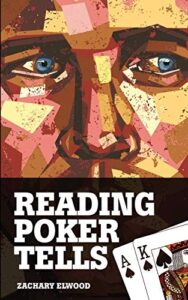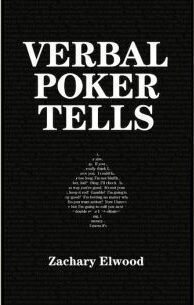Poker Books by Zachary Elwood
Showing all 3 results
Reading Poker Tells
Reading Poker Tells will teach you how professional poker players analyze the facial expressions, body posture, physical gestures, and verbal statements of opponents in a live poker game. More importantly, it provides a mental framework for thinking about and remembering poker tells by emphasizing how common situations can be similar or different, such as the significant difference between a Post-Bet situation and a Waiting-For-Action situation. The book also offers tips on general poker psychology, including methods for deceiving and manipulating opponents, and ways to stay “unreadable.” Many readers have found that the greatest value they got from this book was in being able to eliminate some common tells they were unknowingly displaying.
Verbal Poker Tells
Verbal Poker Tells, is a guide on how poker players inadvertently disclose details about their hands through speech. This work draws from a variety of popular poker broadcasts such as The World Series of Poker and High Stakes Poker, offering insights into players’ verbal cues. Critics have praised the book highly, with Tommy Angelo highlighting its unique and invaluable content, Andrew Brokos likening it to a detailed study of poker players’ verbal slip-ups, and Mason Malmuth affirming its immediate and long-term utility in improving one’s poker strategy.
Exploiting Poker Tells
“Exploiting Poker Tells” marks the final installment in Zachary Elwood’s highly praised trilogy, Reading Poker Tells. This book sheds light on the practical aspects of poker, tackling questions such as the factors behind successful poker reads, which behaviors are crucial during decision-making, and which can be disregarded and the reasons for it. It not only reinforces concepts from his earlier works but also introduces new ideas, offering insights into common opponent behaviors. J. Hase mentions in an Amazon review, “The only books that I absolutely will not share with my poker buddies.” Similarly, Dan Podheiser highlights the book’s effectiveness in providing strategies for understanding opponent tendencies.
Showing all 3 results


